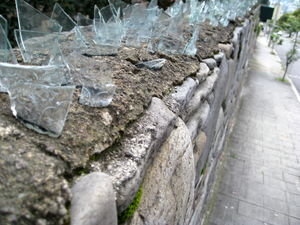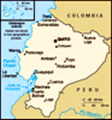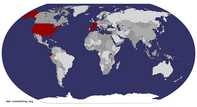Advertisement

 Good fences make good neighbors.
Good fences make good neighbors.
In an effort to keep the ladrones out, people build cement walls around their homes, embedded with broken glass. Quito is a big city, and like any big city, it's dangerous. Like our own city, Denver, Quito has 2 million citizens, but these 2 million Quiteños have to cohabitate in a fraction of Denver´s area. Adding to the temptation to steal is the huge gap between the rich and the poor, and, in particular, between the Ecuatorians and the Americans. While the living wage in America gets you about $2000 a month, the living wage in Ecuador is on the order of $200 a month (The Gross Domestic Product per capita in Ecuador is $4,770, compared to $43,954 in the US). That ten-fold difference in income makes Americans look delicious. If an Ecuadorian were to steal and sell my camera, for example, they would have just secured an entire month's food and rent. Tempting, no? I was painfully aware of this temptation every time I pulled my camera out of my pocket to take a photo.
But Americans aren't the only vicitims of crime in Quito. One of the first things we noticed when we arrived at Carlos and Marta's home in Quito were the lengths to which the Quiteños go to ensure their security. They surround their homes

 Kujo
Kujo
This vicious German Shepherd patrols from on top of a garage in our neighborhood. Every day, as we walked to our Spanish class, he barked and snarled at us like a killer. I really believed he wanted to eat me.with cement walls topped with sharp glass, and cacti. They keep vicious dogs in their yards. They hire security guards 24 hours a day to watch their streets. They lock themselves inside barred metal gates, barred metal doors, and finally wooden doors with big dead bolts. They outfit their homes with alarm systems. They don't even tell their own grandchildren the security codes.
We were warned to be careful. We were warned not to keep anything valuable with us. We were warned to beware of cab drivers and parks and strangers on busses. "Yeah, yeah," we thought. "We're
mujeres del mundo, women of the world. We've been in big dangerous cities before. We'll be fine...." Famous last words.
The day after our arrival in Quito, Audrey and I hit the streets to check out our new city (Aleks had not yet arrived, he was flying in that night). Carefully minding our pockets and our backpack (Audrey had a theft-proof backpack, with zippers that were concealed and inaccessible), we took the trole-bus for 25 cents to a neighborhood called La Mariscal, but which is more commonly known as
Gringolandia. There we found an internet cafe called Papaya Net, where

 Seguridad
Seguridad
In nice neighborhoods (like ours), the neighbors hire a security guard 24 hours a day. He sits, unarmed, in his booth, keeping an eye on the street. If an alarm goes off, his job is to transmit a second alarm to the police, who may or may not come.you could surf the net and sip a big glass of fresh papaya juice at the same time. We strolled the booths at the artisan market, and took pictures of people playing cards on the street. We walked through a park, careful to avoid both the creepy and the not-so-creepy looking strangers within. When a stranger hollered a warning to us about the
"morenos" who might try to rob two
chicas such as ourselves, we wisely didn't engage in a conversation and just got ourselves out of there safely. We navigated the crowded streets in the Old Town, admiring the old architecture, while remaining vigilant to would-be-
ladrones.
We finally found ourselves in an Old Town restaurant called La Fruteria Montserat. We walked in past a private security guard at the door, and felt relieved to find respite from the crowded street. I ordered a
locro de papas, a thick creamy soup with potatos and avocados and cheese, and an
empanada de verde, with dough made of green bananas and filled with
queso. Audrey got
morocho, a chai-flavored rice pudding drink, and a sweet sugary
empanada. The restaurant was nearly vacant, with only a few other patrons scattered here and

 Naipes
Naipes
Men betting on cards in La Mariscal. I just had to risk taking my camera out of my pocket to take this photo.there. We sat down at a table in the airy restaurant, and allowed ourselves to relax from our vigilance. We took a deep sigh and dove into our delicious food.
About half way through our empanadas, Audrey said to me, "my backpack is gone." I thought she was joking. She had placed it under her chair, and I had been sitting across from her, looking at her the entire time we had been seated. The only person I remembered passing our table was the waiter when he brought our meals. I really couldn't believe it. It was like magic. Luckily there was nothing valuable in the
mochila; just two purple raincoats, one Ecuadorian guide book, one water bottle, one Spanish-English dictionary, a small bottle of Purell hand sanitizer, and Audrey's notebook. They didn't get any money, they didn't get our cameras, they didn't get our house keys, and they didn't get Audrey's Star Trek pen. We felt lucky. We felt foolish. We felt angry at Quito.
As we left the Fruteria, short one theft-proof backpack, Audrey addressed the security guard at the door. "
Para que lo sepas," she said, "so that you know, someone stole our backpack while

 Mujeres del Mundo
Mujeres del Mundo
OK, even though we pride ourselves as being "Women of the World," we were silently being robbed while we sat here enjoying sweet empanadas and morocho at la Fruteria.we were eating in there." He shrugged unsympathetically. As we rounded the corner down the street I looked back. The guard was watching us and laughing quietly to himself. Maybe he was in on it. Maybe he thinks we're stupid. Maybe he just thinks it's funny that we would even bother telling him.
After the backpack got stolen we were even more careful than we had been. That first day out, we learned that in Ecuador, you have to pay in cash, and you can only use bills of small denominations, since no one keeps change. Even a $20 bill is too much to work with. Unfortunately, I had all of my money in larger bills ($50s and $20s), so I had to do something about that while I had a chance. The day after Aleks arrived, the three of us went to a bank to get change for my big bills. We split the money between the three of us (I had $360 to change, so I gave each of us two 50's and two 20's). Each of us artfully hid the money in various pockets and bra compartments. We got to the bank safely, took a quick

 Old Town
Old Town
The Old Town looked different after our backpack was stolen. We felt angry and violated. It all seemed very ugly.huddle, and I approached the teller's window with my $360 and asked him to change my money into 5's and 1's. The first teller could only change a $20, which he did methodically and accurately. He then sent me next door to the other teller to change my remaining $340.
Through the slot under the bullet-proof window, I handed the second teller my money. He methodically counted it out once, twice. Next he pulled out a stack of 5's and 1's and counted it out once, twice. A third time he counted my money, then laid my stack of 50's and 20's down in his drawer. About to hand over my change, he asked, "You had $400, didn't you?" "No, I only had $340," I replied. "No, you had $400," he asserted. "No, $340," I said again. He wouldn't take my word for it, and he insisted I had had $400. I realized that he must have mistakenly counted the two $20s as if they had been $50s. I approached Audrey and Aleks who had been waiting near the door. As I started to recount my odd tale, they looked crestfallen. "We should have gone up there with you.

 Cash only, please.
Cash only, please.
In Ecuador you have to pay for everything with cash. And don't even think about dropping a $20. No one will have change for you. you need to carry ones and fives, and it's important to keep them spread out in different pockets, just in case you get mugged.You got ripped off by the teller, didn't you?" "No," I said, "not this time." We laughed at how this had played out, at how the teller wouldn't believe me and how he insisted that I take extra money. We decided to put the extra $60 in a "Quito giveth and Quito taketh away" fund. Maybe we would buy new raincoats with this money. Maybe a new backpack. Maybe a new waterbottle.
We were lucky overall. During our entire time in Ecuador, we only got robbed the one time at the Fruteria. Other people weren't so lucky. We heard so many stories of far-out scams and robberies, that we at first thought they must be urban legends, but enough of them were validated by our American friends, that we have to believe them.
For example, we were warned not to call cabs for ourselves, and not to get into cabs off the street. Not all yellow cars are real taxis with real taxi drivers. Apparently, phone calls to cab companies can be intercepted. When they hear your non-native accent, they send a fake cab to pick you up. After getting you wherever they want you, they take all

 Taxi?
Taxi?
You never know if the yellow car you see on the street is a real taxi or if it's a robber in sheep's clothing.of your stuff and drop you remotely. Although this never happened to us, we did have a VERY sketchy cab ride where the driver rigged the meter to rip us off, and we overheard him saying on the radio to a fellow driver,
"Las maletas de los negros no valen" ("Black people's suitcases aren't worth anything."). Scared the pants off of me.
We were warned not to accept ANYTHING from ANYONE on the streets of Quito, for fear of being drugged and mugged. We were told that the criminal may approach his victim with a piece of paper (maybe a leaflet, maybe a map, maybe a newspaper) laced with the drug scopolamine, which he hands to his victim. The drug crosses the skin and knocks the person out. They're robbed and left in the street. We were surprised when one of the American girls (who was working in the Quito hospital) saw two native Ecuatorian patients who had each been scopoloamine drugged and mugged by a taxi driver, and dumped out of the cab.
We heard of the mustard schtick. Robber #1 slyly squirts mustard on the victim's back. Robber #2 kindly stops the mustard-laden victim to notify

 Counterfeit
Counterfeit
Another dimension of Ecuatorian crime: Counterfeit money. Ecuador switched from the Sucre to the Dollar in 2000, and this has supposedly attracted ne'erdowell drug-running Colombians to Ecuador, where they can easily launder money into a stable currency, like the US Dollar, committing all sorts of crime in the process.him and direct him towards a bathroom so that he can clean up. Laying in wait in the bathroom is Robber #3, ready to attack and rob his unsuspecting prey. This happened to one of the guys in the program, but luckily he didn't fall for it; he high-tailed it out of there with mustard all over his back.
We were warned to be extremely careful at banks. Even though banks have security guards, it's common that a theif will slyly mark you when you're at the bank. Maybe it'll just be a little sticker or something hardly noticeable. As you leave the bank and get out of the security guard's range, you'll be tracked and followed. A few blocks away you'll be mugged.
At the end of the month after returning to Quito, one of our roommates at Carlos and Marta's house got mugged. Tiffany was walking alone in the rain, umbrella in one hand, chocolate bar in the other. Three young guys approached her and threatened her with a bottle as they stuck their hands into her pockets. She tried to reach for her mace, but then just decided to start screaming loudly. Luckily the attackers

 Glass fences
Glass fences
Coke bottle, fighting crime.ran away when she screamed. She's not sure what they got from her pockets, but we were all just glad she was safe.
Quito giveth and Quito taketh away. We were lucky in Quito.
Advertisement
Tot: 0.085s; Tpl: 0.013s; cc: 7; qc: 24; dbt: 0.0373s; 1; m:domysql w:travelblog (10.17.0.13); sld: 1;
; mem: 1.1mb












Stella
non-member comment
I loved your scary stories and am glad the back pack was all you had stolen. The coke fighting crime is a great caption and picture. Looking forward to more stories from Ecuador.